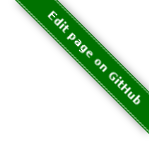%>perl -wc menu_local.conf menu_local.conf syntax OK
Menu Configuration
The main left menu is highly editable through menu_local.conf. It is recommended apply changes only to your menu_local.conf in order to avoid conflicts on updating Thruk.
Navigation configuration is split in two files
-
menu.conf
-
menu_local.conf
The menu.conf contains the default side menu configuration. Do not change it as this file will be overwritten with every update. If you want to create a complete custom navigation, just copy this file to menu_local.conf and adjust it to your needs. See the next chapter on how to add just add a few links without having to copy the complete file.
The menu_local.conf contains the user configuration for the side menu. It usually
does not exist by default and has to be created in /etc/thruk/.
The file itself is perl syntax, so you can do whatever perl can do. Make sure you verify the syntax after changing the file. The changes will be used immediately. So maybe you want to test your changes on a test instance first.
|
Syntax Check for Menu Configuration
|
|
No Restart Required
Thruk does not need to be restarted and immediately displays changes in the menu_local.conf. |
If you just want to add a few entries, create a empty menu_local.conf and put these lines into it:
do '/usr/share/thruk/menu.conf';
insert_item('General', { 'href' => 'http://labs.consol.de', 'name' => 'Labs', target => '_blank' });
Adding new Section
You can add new sections with:
add_section('name' => 'General');
You can insert sections at a given position with:
insert_section(2, 'name' => 'Projects');
Adding a new Link
To add a new link use the following syntax:
add_link('name' => 'Home', 'href' => '/thruk/main.html');
-
name: This is how the link is called in the web front end.
-
href: This is the destination link optional you can add.
-
target: Target frame for this link. (
_parentand_blankopen as popup,embeddedopens embedded. Empty target opens in the same window.) -
icon: Used for themes which support icons.
-
html: If set, all other attributes are ignored and the plain html data is inserted in the menu
Then the config looks like this:
Open grafana in a new window:
add_link('name' => 'Grafana', 'href' => '/grafana', 'target' => '_blank');
Open grafana embedded:
add_link('name' => 'Grafana', 'href' => '/grafana', 'target' => 'embedded');
'add_link' always adds the new link to the last section. Use 'insert_item' to add a link to any section.
Including original side navigation
You can include the main menu config with the perl do statement. Ex.: If you just want to add a new link to your config menu, your menu_local.conf could look like this:
do $ENV{'OMD_ROOT'}.'/share/thruk/menu.conf';
add_link('name' => 'Wato', 'href' => '/'.$ENV{'OMD_SITE'}.'/check_mk/wato.py?filename=wato.mk');
This example just puts the Wato link from check_mks Multisite in your config section. Replace the ENV part with a proper path if you do not use OMD.
Inserting item in existing Section
Adding Items to existing sections can also be achieved by 'insert_item':
do $ENV{'OMD_ROOT'}.'/share/thruk/menu.conf';
insert_item('General', { 'href' => 'http://your-company.com', 'name' => 'Company' });
Use 'insert_sub_item' to create a new sub entry to an existing link.
do $ENV{'OMD_ROOT'}.'/share/thruk/menu.conf';
insert_sub_item('General', 'Home', { 'href' => 'http://your-company.com', 'name' => 'Company' });
Removing item in existing Section
Existing Items can be removed with the 'remove_item' function:
do $ENV{'OMD_ROOT'}.'/share/thruk/menu.conf';
remove_item('Reports', 'Availability');
To remove a sub menuitem, use the 3 arguments variant of remove_item:
do $ENV{'OMD_ROOT'}.'/share/thruk/menu.conf';
remove_item('Current Status', 'Problems', 'Network Outages');
To remove a sub menuitem hint, use the 4 arguments variant of remove_item:
do $ENV{'OMD_ROOT'}.'/share/thruk/menu.conf';
remove_item('Current Status', 'Problems', 'Services', 'Unhandled');
Remove complete Section
Existing sections can be removed completely the 'remove_section' function:
do $ENV{'OMD_ROOT'}.'/share/thruk/menu.conf';
remove_section('Reports');
Make item available for some groups only
Just wrap your changes in a 'has_group' condition.
if(has_group('Admins')) {
insert_item('Admins Only', { 'href' => '.../only_for_admins.html', 'name' => 'Admin Link' });
}
Make item available for some roles only
Just wrap your changes in a 'has_role' condition.
if(has_role('authorized_for_configuration_information')) {
insert_item('System', { 'href' => '.../only_for_some_roles.html', 'name' => 'Admin Link' });
}
You can check multiple roles at once:
if(has_role('authorized_for_configuration_information', 'authorized_for_system_information')) {
insert_item('System', { 'href' => '.../only_for_some_roles.html', 'name' => 'Admin Link' });
}
Make item available for some specific user only
Just wrap your changes in a 'is_user' condition.
if(is_user('thrukadmin')) {
insert_item('Admins Only', { 'href' => '.../only_for_some_user.html', 'name' => 'Admin Link' });
}
Add item at specific position
Use before or after to set a specific position.
insert_item('Current Status', { 'href' => '...', 'name' => 'My Hosts', 'after' => 'Hosts' });
Insert arbitrary HTML
It is possible to insert arbitrary HTML in the menu by specifying the html attribute. You may have to use CSS to style the content to your needs.
insert_item("General", {html => "<a href='#test'>test: <img src='/thruk/themes/Thruk/images/logo_thruk_small.png'></a>" })
Examples
Hide Reporting for Non-Admins
Create a /etc/thruk/menu_local.conf like this:
do $ENV{'OMD_ROOT'}.'/share/thruk/menu.conf';
if(!has_group('Admins')) {
remove_item('Reports', 'Reporting');
}
|
This only hides the reporting menu item, everbody who knows the url can still access it. |
Add new item with arbitrary HTML
This example adds a link to your company and adds a image icon behind that link.
do $ENV{'OMD_ROOT'}.'/share/thruk/menu.conf';
insert_item('General', {
'href' => 'http://your-company.com',
'name' => 'Company',
'target' => '_blank',
'html' => '<img src="/thruk/themes/Thruk/images/stop.gif" style="height:16px; width: 16px; vertical-align: bottom;">'
});
